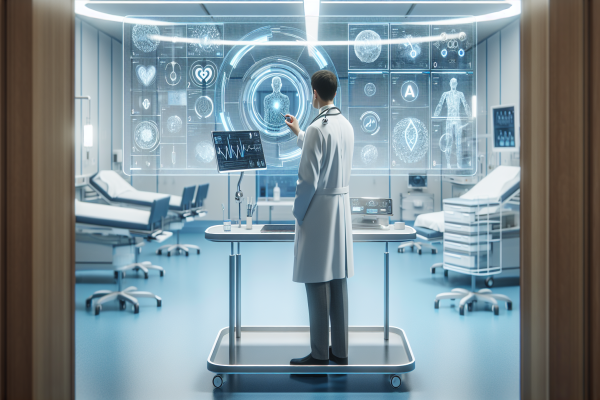
Revolutionizing Healthcare: The Transformative Role of AI in Modern Medicine
In today's fast-paced world, Artificial Intelligence (AI) is making waves across various industries, from finance to entertainment. However, one of the most promising fields where AI is set to make a significant impact is healthcare. This blog aims to explore the transformative role of AI in modern medicine, offering insights for healthcare professionals, clinic managers, and medical tech enthusiasts.
Understanding AI in Healthcare
Definition and Overview
AI in healthcare refers to the use of complex algorithms and software to emulate human cognition in the analysis, interpretation, and comprehension of complicated medical and healthcare data. Unlike traditional technologies used in healthcare, AI can gather data, process it, and provide a well-defined output to the end-user.
Historical Perspective
AI's journey in the healthcare sector began with simple rule-based systems in the 1970s. Over the decades, it has evolved into sophisticated systems capable of diagnosing diseases, predicting patient outcomes, and even assisting in surgeries. This evolution has been driven by advancements in machine learning and data analytics.
Key Applications of AI in Healthcare
Diagnostic Imaging and Radiology
AI enhances the accuracy and efficiency of diagnostics by analyzing medical images such as X-rays, CT scans, and MRIs. For instance, AI systems can detect tumors at early stages, providing radiologists with critical insights that improve patient outcomes.
Personalized Medicine
AI plays a crucial role in creating personalized treatment plans. Companies like 23andMe use AI-driven genetic testing to provide insights into an individual's genetic makeup, allowing for tailored treatment strategies that improve efficacy and reduce side effects.
Predictive Analytics and Patient Monitoring
AI's predictive analytics capabilities are revolutionizing chronic disease management. By analyzing patient data, AI can predict potential health issues, enabling proactive interventions. A notable example is the use of AI in monitoring diabetic patients, reducing hospital admissions by predicting and managing complications.
Benefits of AI in Healthcare
- Improved patient outcomes and care quality.
- Cost reduction and operational efficiency.
- Enhanced decision-making processes for healthcare providers.
Challenges and Ethical Considerations
Data Privacy Concerns
With the vast amount of data AI systems process, ensuring data privacy and security is paramount. Healthcare providers must implement robust security measures to protect sensitive patient information.
Ethical Implications
The ethical considerations of AI decision-making in healthcare cannot be overlooked. There is a need for transparent AI systems that allow healthcare professionals to understand and trust AI-driven decisions.
Future Trends and Innovations
Upcoming AI Technologies
Technologies such as AI-powered telemedicine platforms are set to revolutionize remote patient care. These platforms can provide real-time consultations, reducing the need for physical visits and improving access to healthcare.
Expert Predictions
Experts predict that AI will continue to evolve, with potential applications in areas like drug discovery, robotic surgery, and even mental health support, offering new possibilities for healthcare transformation.
Case Studies and Real-World Applications
Successful AI implementations in healthcare are numerous. For example, IBM Watson Health has been used to analyze large volumes of data to provide insights into cancer treatment, significantly improving patient satisfaction and healthcare efficiency.
Conclusion
AI holds transformative potential in healthcare, offering innovative solutions that improve patient care, reduce costs, and enhance operational efficiency. Healthcare professionals should embrace AI technologies to stay ahead in this rapidly evolving field.
Explore AI solutions for your healthcare practices and learn more about the latest tools available by visiting the Rashflash AI Chatbot.


